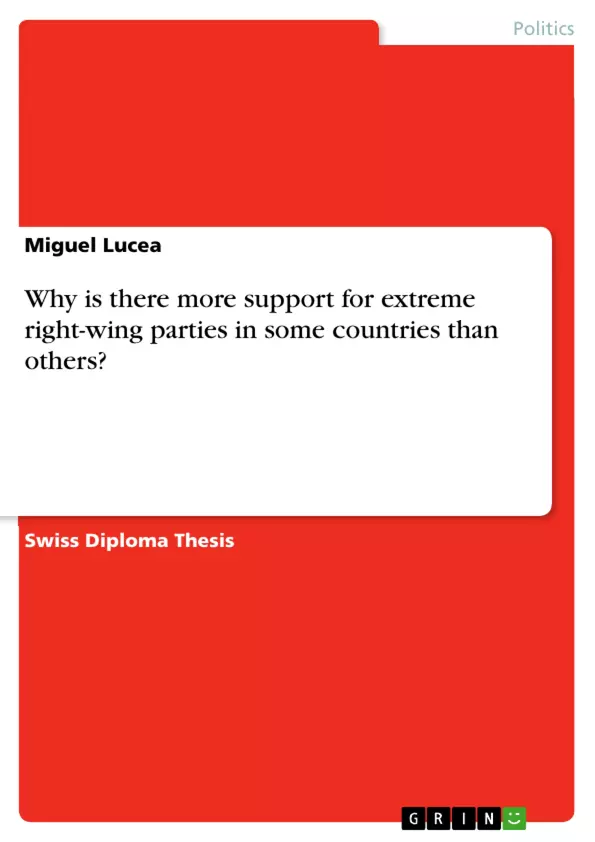This dissertation examines the increased support for right-wing populist parties and aims to explain its uneven results between the different European member States. To answer this question, four main explanatory variables are assessed: Demographic factors, structural ones, unemployment and immigration level. In addition, two opposite case studies are selected, Portugal and Sweden, to measure the dependent variable, right-wing populist support, against the independent one which is an anti-immigration belief. Finished the comparative analysis and quantitative research, two substantive conclusions are obtained: First, feared immigration, due to its cultural consequences, is the primary reason why voters support right-wing populist parties. Second, no country in Europe has enough different demographic factors or political structures prone to ignore this phenomenon.
Inhaltsverzeichnis (Table of Contents)
- Introduction
- Literature Review and Research Design
- Introduction
- Literature Review
- Research Design
- Conclusion
- Sweden Case Study
- Introduction
- Empirical Material
- Portugal Case Study
- Introduction
- Empirical Material
- Comparative analysis
- Quantitative research
- Conclusion
- Further Studies
- Bibliography
Zielsetzung und Themenschwerpunkte (Objectives and Key Themes)
This dissertation investigates the rising support for right-wing populist parties in Europe and aims to explain the uneven results across different member states. It explores four key explanatory variables: demographic factors, structural factors, unemployment levels, and immigration levels.
- The rise of right-wing populist parties in Europe
- Explanatory variables for varying levels of support for right-wing populist parties
- Comparative analysis of case studies (Sweden and Portugal)
- The role of immigration and anti-immigration sentiment in right-wing populism
- The influence of demographic and structural factors on right-wing populist support
Zusammenfassung der Kapitel (Chapter Summaries)
- Introduction: This chapter introduces the topic of right-wing populist parties (RPP) in Europe and highlights the growing support they are receiving. It poses the question of why RPPs are more successful in some countries than others and outlines the dissertation's objectives and methodology.
- Literature Review and Research Design: This chapter provides a review of existing literature on RPPs, focusing on the explanatory variables for their electoral success. It explores factors such as demographic variables, structural factors, unemployment, and immigration. The chapter also outlines the dissertation's research design and methodology.
- Sweden Case Study: This chapter examines the case of Sweden, focusing on the empirical material related to right-wing populist support and the role of anti-immigration beliefs. It analyzes the specific factors contributing to the success of RPPs in Sweden.
- Portugal Case Study: This chapter investigates the case of Portugal, similar to the previous chapter, focusing on empirical material related to right-wing populist support and the role of anti-immigration beliefs. It analyzes the specific factors contributing to the success of RPPs in Portugal.
- Comparative analysis: This chapter undertakes a comparative analysis of the two case studies (Sweden and Portugal), comparing the findings related to right-wing populist support and the role of anti-immigration beliefs. It seeks to identify commonalities and differences across the two countries.
- Quantitative research: This chapter presents quantitative research findings related to right-wing populist support and the explanatory variables. It analyzes the data collected to test the hypotheses and draw conclusions about the relationship between these variables.
Schlüsselwörter (Keywords)
The main keywords and focus topics of this dissertation are right-wing populism, electoral success, European member states, demographic factors, structural factors, unemployment, immigration, anti-immigration sentiment, comparative analysis, quantitative research, and case studies.
Frequently Asked Questions
Why is support for right-wing populist parties uneven across Europe?
The dissertation explores explanatory variables like demographic factors, structural differences, unemployment, and immigration levels to explain this variation.
What is the primary driver for supporting right-wing populism according to the study?
The research concludes that feared immigration, specifically due to its perceived cultural consequences, is the primary reason for voter support.
Which countries are used as case studies in this dissertation?
Portugal and Sweden are selected as opposite case studies to measure right-wing populist support against anti-immigration beliefs.
Does unemployment significantly cause the rise of the extreme right?
While unemployment is assessed as a variable, the study finds that cultural fears regarding immigration are a more substantive predictor of RPP support.
Are some political structures in Europe immune to right-wing populism?
The study concludes that no European country has demographic or structural factors strong enough to completely ignore the phenomenon of rising right-wing populism.
- Citar trabajo
- Miguel Lucea (Autor), Why is there more support for extreme right-wing parties in some countries than others?, Múnich, GRIN Verlag, https://www.grin.com/document/974137



